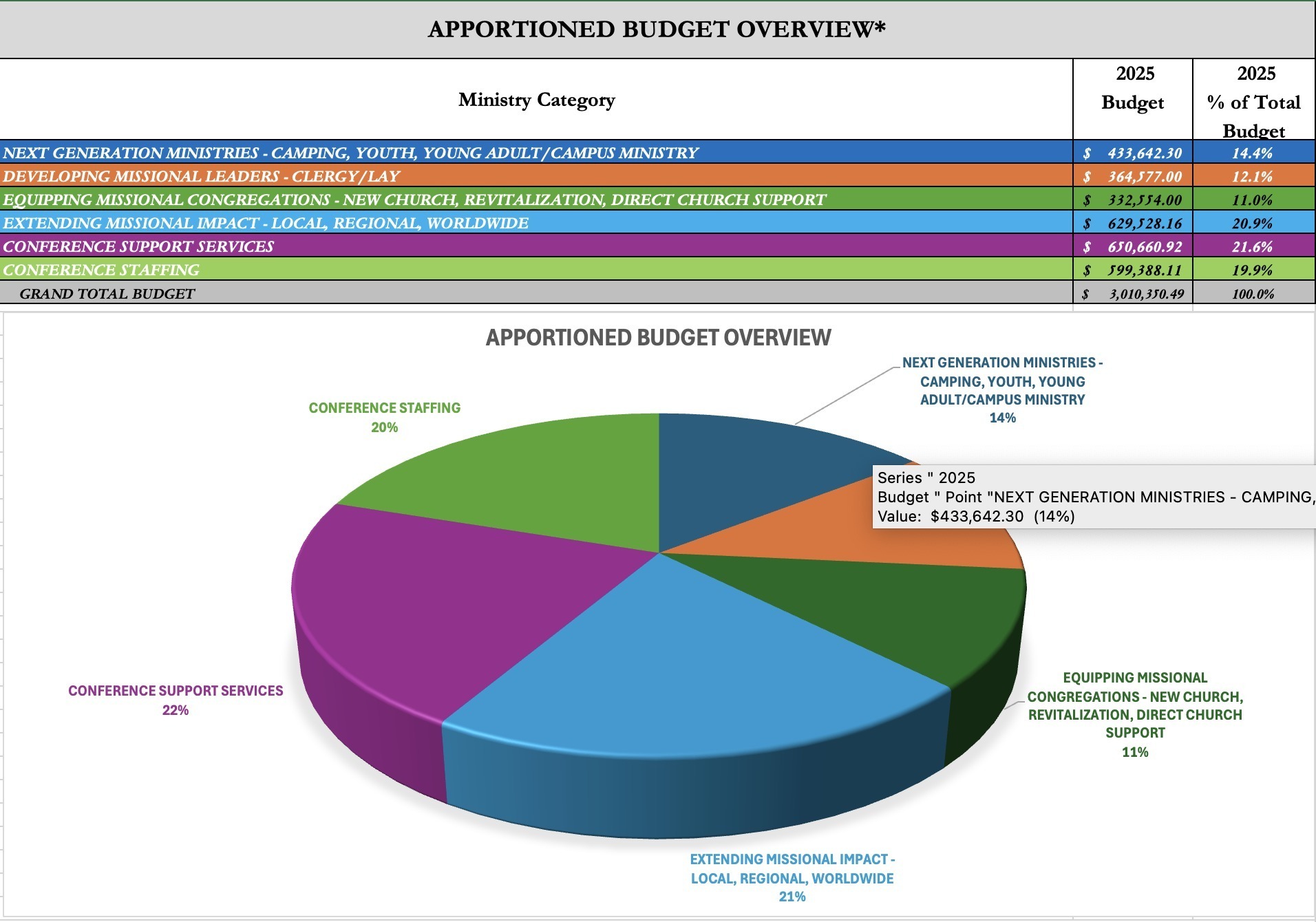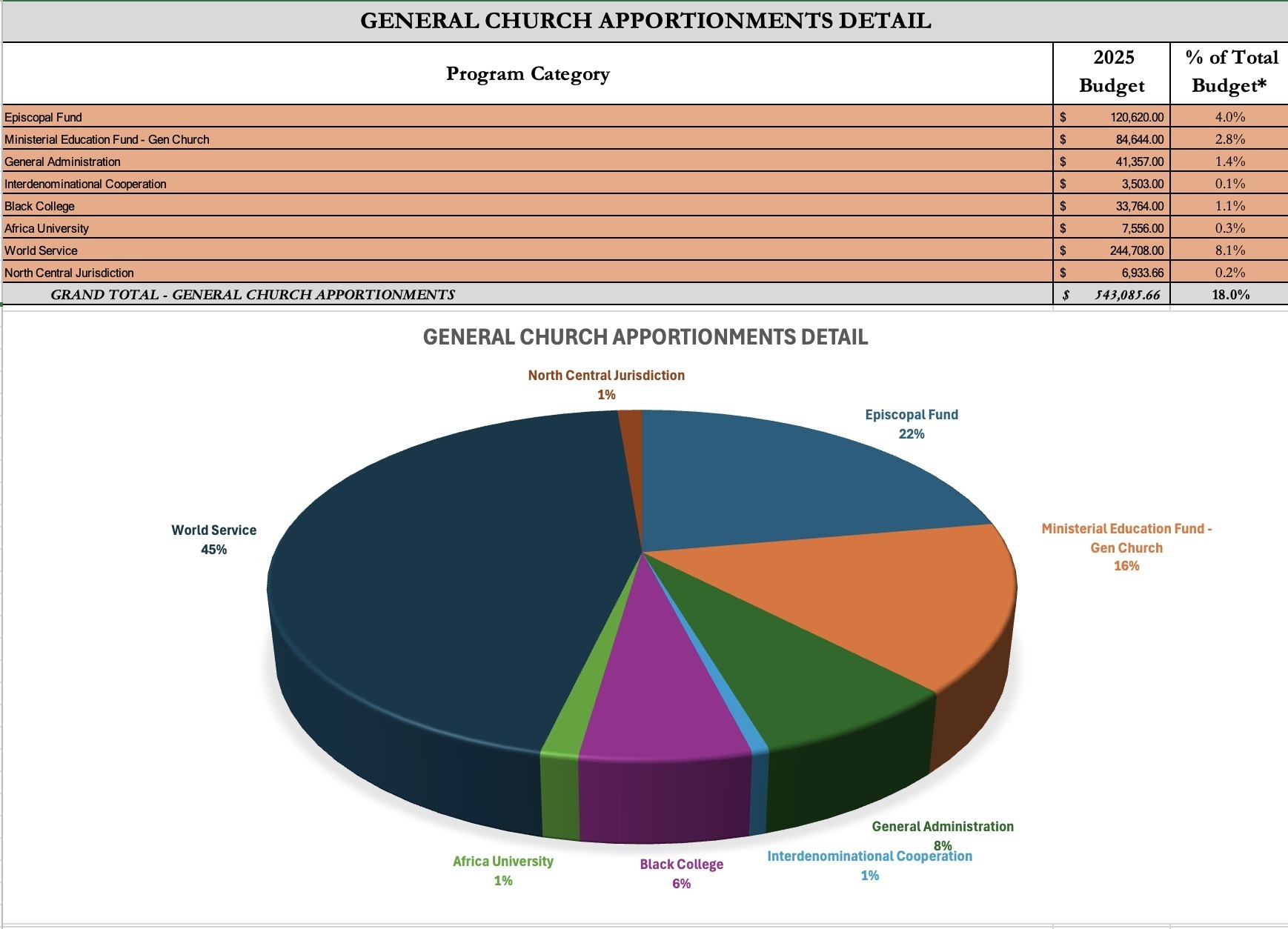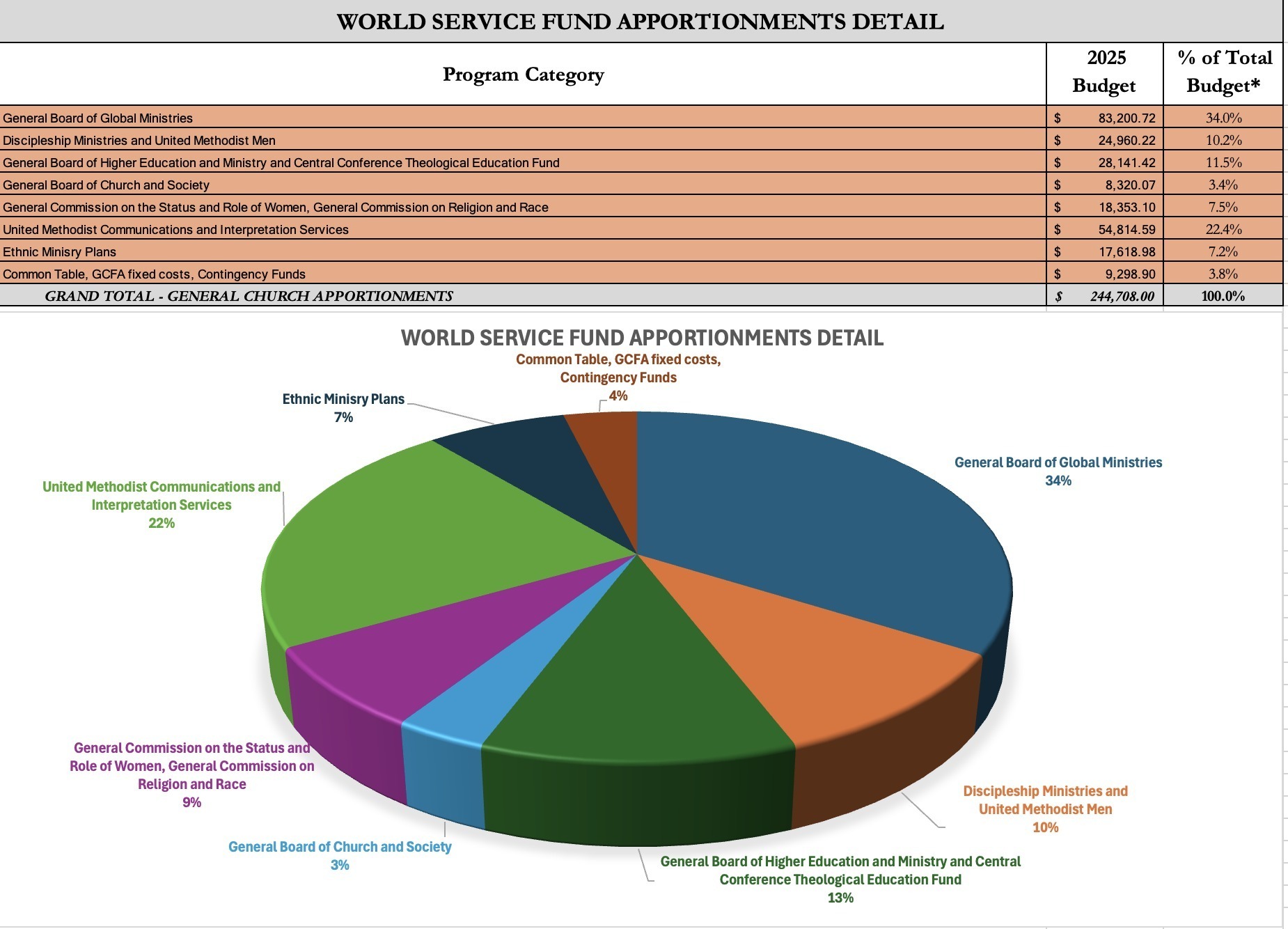
Connection in Action: Apportionments extend shared mission and ministry
"All the believers were one in heart and mind. No one claimed that any of their possessions was their own, but they shared everything they had." Acts 4:32 NIV
This image of the early church from the Acts of the Apostles paints a vision of love, care, and mutuality that can be hard to conceive in a world of hyper-individualism, materialism, and division. Yet, United Methodists worldwide seek to capture a bit of this vision through one aspect of our connectional system—apportionments.
What are apportionments
Apportionments are the financial resources that are contributed to the larger mission of the United Methodist Church. Congregations combine a portion of their offerings to accomplish mission and ministries that are either beyond their ability to do individually (e.g., run a camp, establish a college in Africa, create infrastructure for disaster response) or can be done more effectively or efficiently when done together (e.g., create resources to prevent abuse, develop systems for recruiting, training, and deploying pastors, ensure infrastructure and leadership for providing administrative support of churches).
Apportionments are also a means for every congregation to invest "equally" in our shared mission. Apportionment requests are set by a formula. The formula is set proportionally so that each church gives according to what God has entrusted them to steward (think Parable of the Talents, Matthew 25). The amount is different for each congregation but is a proportional sacrifice. This formula for local churches varies by annual conference. In the Dakotas Conference, the formula is currently 13% of a church's general operating income.
Additionally, apportionments are an opportunity for mutual discernment. The apportionment formula, as well as the ways in which apportionments are used, is not only determined by prayer but also by a "democratic" process and structure. Every church/charge has a pastor and an elected lay member as voting members of the annual conference. At the annual conference session each year, the Conference Council on Finance and Administration (elected by annual conference members) brings a recommended apportionment formula and recommended budget that members discuss, amend if desired, and vote on. A similar process occurs regarding General Church apportionments every four years through the votes of General Conference delegates. Through these processes and elected individuals, congregations work together to discern how God calls us to steward our resources.
"Apportionments reflect our commitment to being a connectional church," said Bishop Lanette Plambeck. "They allow us to join together in mission, accomplishing far more than any one congregation could achieve alone. Through this shared giving, we reach beyond our local settings to transform lives and share God's love with the world."
Supporting the mission
Apportionments support the mission of the United Methodist Church—to make disciples of Jesus Christ for the transformation of the world. Jesus said, "Where your treasure is, there your heart will be also." (Matthew 6:21 NIV). Like tithing and stewardship that we teach in our local churches, giving through apportionments is a communal formational practice that cultivates spiritual maturity and counter-cultural, Christlikeness. It is a spiritual practice that shapes our hearts, our character, and our worldview. It forms us in a posture of surrender, trust, abundance, and faith.
This act of connectional generosity helps us focus beyond ourselves and reminds us of our interconnectedness and our need for one another. Our connectional structure and giving bears witness to our belief in building up other members of the body and bearing one another’s burdens. One way we do that is by providing support systems and resources—including human resources—that help churches and leaders discover missional opportunities, navigate conflict or crisis, manage their organizational responsibilities, and make new disciples. We belong to one another. We are a part of someone in another church, community, or country coming to know Jesus, having clean water, medical or educational resources, or experience transformation because of our generosity.
Apportionments also support the mission through the ministries, programs, systems, and services that are made possible by this shared missional giving. Many of those are outlines and celebrated each year at annual conference and the pie charts and tables below outline how our apportionments are distributed and utilized. However, the scope and reach of United Methodist missional impact is broad and deep. Through our shared apportioned giving:
- UMCOR provides infrastructure to deliver aid, provide disaster response training and support casework and long-term recovery initiatives, and ensures that all donations for disaster relief go directly to those in need and are not used to cover administrative costs.
- United Methodist missionaries serve in about 60 different countries in many types of professional careers, including as pastors, evangelists and church coordinators; teachers and educators; doctors, nurses and other health workers; agriculturists; development specialists; community organizers and peacebuilders.
- Global Ministries increases access to clean and safe water; revitalizes sanitation facilities and shares knowledge on sanitation and waste management; and helps to reduce infection from preventable, water-borne diseases by enhancing the quality of care in health facilities.
- GBHEM provides an average of $4 million is awarded to help students in the U.S. and abroad pursue higher education, opening pathways for students of all backgrounds to earn their degrees and serve as the next generation of leaders for the church and the world.
- UMC general agencies provide resources to help churches welcome people of all abilities, recruit volunteers, develop stewardship, and reach new people, utilize liturgies, sermons starters, and resources for planning and leading worship, understand what racism is, how it has and still shows up in the church and society, and how it impacts and impedes the integrity and effectiveness of God’s people gathered as the church, and understand and advocate for systems and policies that combat domestic violence, improve global health, support climate justice, and work for human and civil rights.
These are just a few of the countless examples of the fruit born because of faithful offerings of United Methodists around the world and within the Dakotas.
“I want to take this opportunity to thank churches of all sizes and contexts who give so faithfully through our Conference apportionments," said Jim Ducker, Dakotas Conference treasurer. "Whether it’s helping to support our conference leaders, our camps, missionaries, or our broader worldwide connection, your apportionment giving helps create and sustain vital ministries that are making a difference in people’s lives every day and demonstrates what it means to be Christ followers. What we do together as United Methodists is far more than any one congregation can do by itself, and I look forward to seeing how the Spirit continues to move within our conference and our broader United Methodist connection, thanks to your support!”

These tables and pie charts represent the 2025 Dakotas Annual Conference budget that is supported by apportioned dollars for various programs and ministries.
CONFERENCE APPORTIONMENT - MISSIONAL BUDGET FOR 2025
The first category is ministry with the Next Generation. Camp and Retreat Ministry creates space and opportunities for spiritual growth for all ages. However, the core of their work centers around children and youth encountering Christ, community, and creation. A portion of this ministry is funded by registration fees, donations, and reserve funds that help offset the care of our campsites and facilities. Apportionment dollars cover the cost of administrative infrastructure (finance/benefits staff and systems) that enable the ministry to function and shared area staff that supports camping and provides promotional and registration/administrative support for conference youth events such as DakYouth and Winter Connection. In addition to camping and youth ministry, this next-generation category includes dollars apportioned to support young adult and campus ministry—through Dakota Wesleyan campus ministry and grants to churches starting college-aged ministries in their college towns.
The second category is the work of Developing Lay and Clergy Missional Leaders. Included in this category is recruiting clergy, vetting them through interviews, background checks, and psychological evaluations, onboarding and training for new clergy, and providing events and resources for continuing education, support, and accountability. Lay discernment and training events, as well as internships for youth and young adults exploring ministry, are funded through this apportioned budget. Because a good portion of their work is spent helping develop leaders, a portion of the budget for district superintendents is included in this category.
*The Thriving in Ministry Lilly grant underwrites the cost of staff and support services for the Higher Ground initiative that supports clergy well-being and holistic leadership development.
The next area of shared mission funded by apportionments is Equipping Missional Congregations. This includes resources and support services for starting new churches and ministries to reach new people. Additional funding supports existing congregations through coaching, training, and resources. A portion of the budget for DSs is included because of their direct support of local churches.
*The Thriving Congregations Lilly grant underwrites the work of the Dakotas Connection Initiative Rural ministry work.
Extending Missional Impact encompasses ministries within the Conference as well as around the world. Solar Oven Partners and Spirit Lake Ministry Center are funded by apportionment dollars and direct donors. This category also includes scholarships for Volunteers in Mission and Breakthrough Ministry grants for local churches (also supported by the Foundation.) A portion of the salary of the Missional Impact Development Coach is allotted to this budget category. Finally, the work of the local church/Conference is extended through our General Church apportionments (see detailed explanation below.)
Apportionments for Support Services establish an infrastructure to assist local church and conference leadership in mobilizing the organization for mission. These apportioned dollars fund communications, trustees, finance and benefits, chancellors, archives and history, and expenses for introducing and moving clergy. These funds also underwrite a portion of our annual conference session, where clergy and lay leaders are equipped and inspired for ministry, and members make decisions about our shared missional priorities.
Conference Staff supports the work of providing trained, supported, and equipped pastoral leadership, facilitating ongoing resources, continuing education, support, and accountability, answering questions, and guiding clergy and lay leaders to resources, help, ideas, suggestions, and support—a reminder that we are not alone in the work we're called to.

This table and pie chart represent the Dakotas contribution to General Church apportionments.
GENERAL CHURCH APPORTIONMENTS
General Church Apportionments are contributed to seven funds.
Episcopal Fund supports the work of Bishops worldwide. The fund pays salaries, benefits, and office expenses. It also covers the cost of travel for church leaders to promote our denomination's temporal and spiritual interests.
Ministerial Education Fund allocates 25% of its receipts to stay within the Annual Conference for scholarships, continuing education, and other programs developed by the Conference Board of Ordained Ministry. 75% of the receipts support the thirteen United Methodist seminaries and the ministerial education programs made available through our denomination.
General Church Administration Fund finances General Church activities such as the cost of the General Conference, the Judicial Council of the church, and the office of administrative oversight and fiscal accountability.
North Central Jurisdictional Fund supports the cost of the North Central Jurisdictional Conference, which meets every four years. This Conference elects and assigns Bishops for the denomination.
Interdenominational COOP Fund helps our denomination nurture the ministries of churches from pan-Methodist churches and other denominations that confess one holy, universal, and apostolic church advocating for global peace and justice.
Africa University Fund supports the only United Methodist, degree-granting university on the continent of Africa. The University was initiated by a vote of the 1988 General Conference. It promotes academic excellence and the physical and spiritual development of men and women from across the continent of Africa.
World Service Fund is the heart of our denomination's worldwide presence, underwriting Christian mission and ministry worldwide. This fund strengthens our evangelism efforts, stimulates church growth, expands Bible studies, and enriches spiritual commitment. Apportionment dollars for the World Service Fund are distributed to:
- General Board of Global Ministries supports missionaries around the globe and in the US; works to strengthen global health systems, support maternal, newborn, and child health, and promote water, sanitation, and hygiene; evangelism and church revitalization through mission connections and initiatives, leadership development, and multiethnic ministries; humanitarian relief and recovery efforts, environmental sustainability, global migration/refugees, sustainable agricultural initiative in Africa; United Methodist Committee on Relief (UMCOR)

This tables and pie chart represent the Dakotas apportionments that go to the World Service Fund.
- Discipleship Ministries and United Methodist Men connect leaders with needed resourcing, training, consulting, and networking that support spiritual formation, new church development, revitalization of local churches, and materials for use in Central Conferences.
- General Board of Higher Education and Ministry and Central Conference Theological Education Fund offer connectional, contextual, and collaborative programs to support the church, the academy, and the world; the latter provides financial support for theological education in central conferences (outside the US).
- General Board of Church and Society leads and challenges United Methodists to pray, study, and work in areas of social concern. Its resources inform, motivate, and train United Methodists on issues of social justice in society.
- General Commission on the Status and Role of Women, General Commission on Religion and Race - advocates for women's full participation in the church and addresses discrimination against women; aims to hold the church accountable for its commitment to reject racism through conversations, resources, training, advocacy, monitoring, and focus areas.
- United Methodist Communications and Interpretation Services seeks to increase awareness and visibility of the denomination in communities and nations around the globe. It also offers services, tools, products and resources for communications ministry.
- Racial-Ethnic Ministry Plans include the Asian American Language Plan, Korean Ministry Plan, National Plan for Hispanic/Latino Ministry, Pacific Islander Ministry Plan, Native American Comprehensive Plan, and Strengthening the Black Church for the 21st Century. These plans aim to expand the ministry of The United Methodist Church without compromising the ethnic and cultural context of each of the communities they serve.
- Common Table, GCFA fixed costs, Contingency Funds - Administrative Leadership and systems for the denomination.